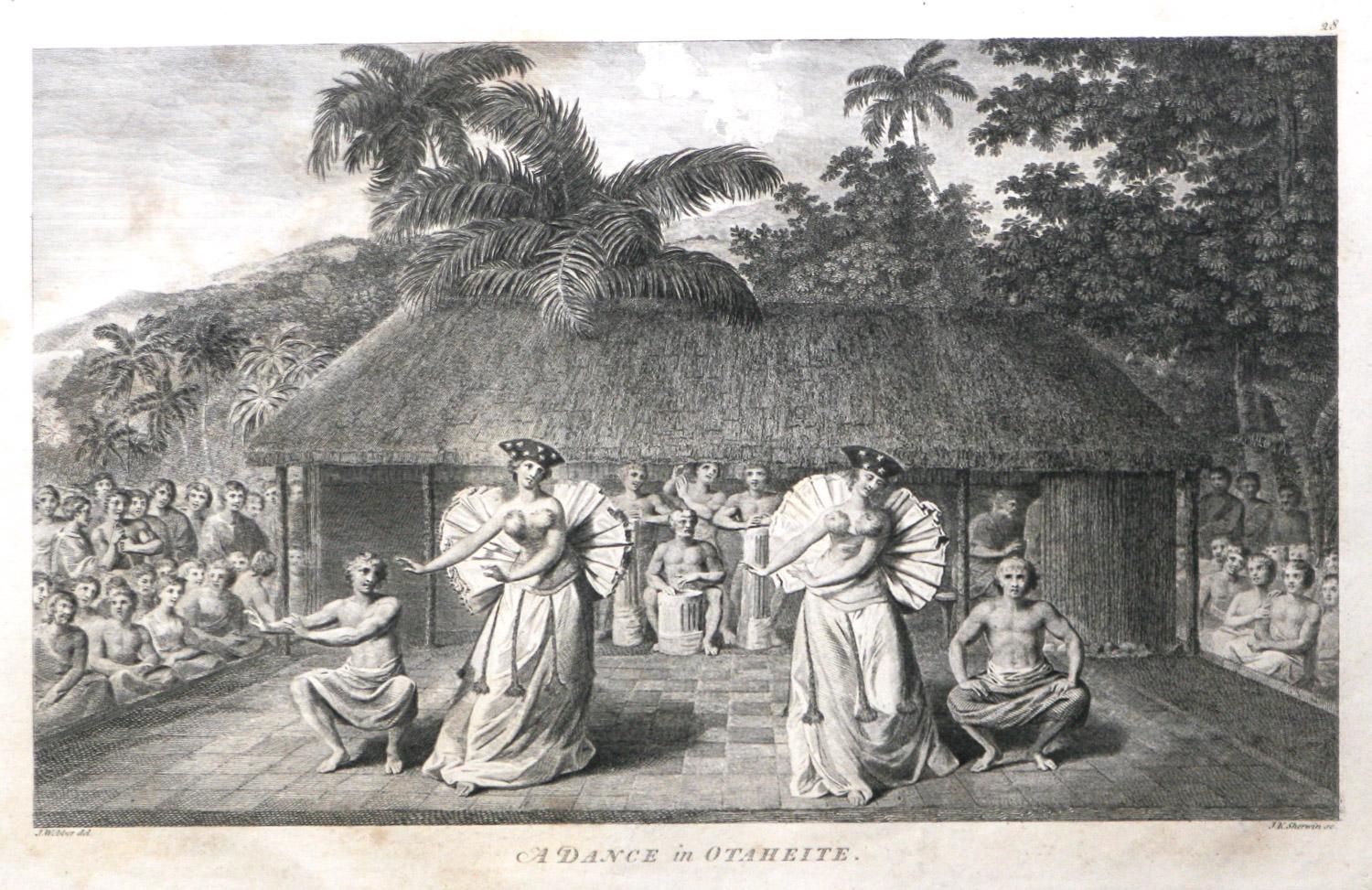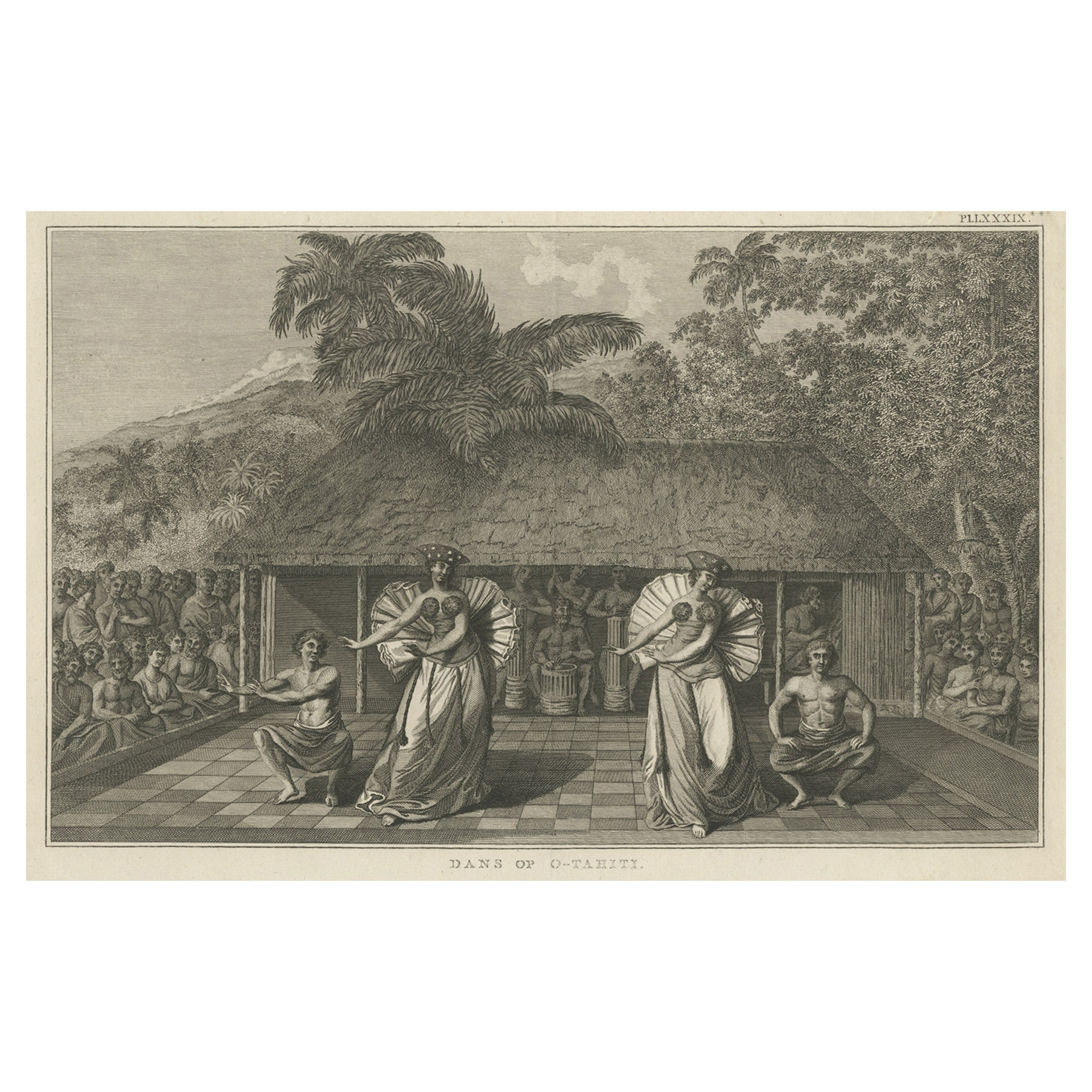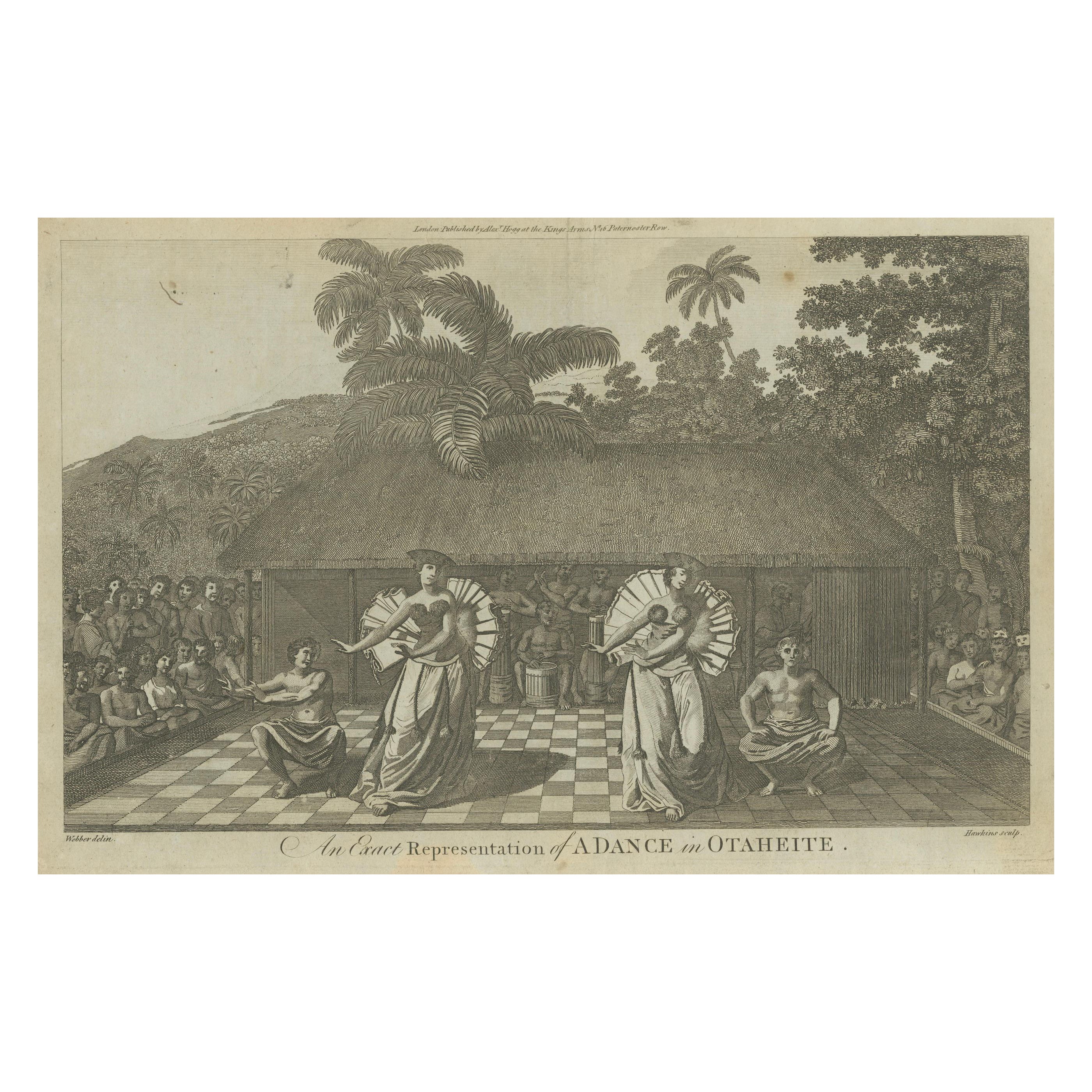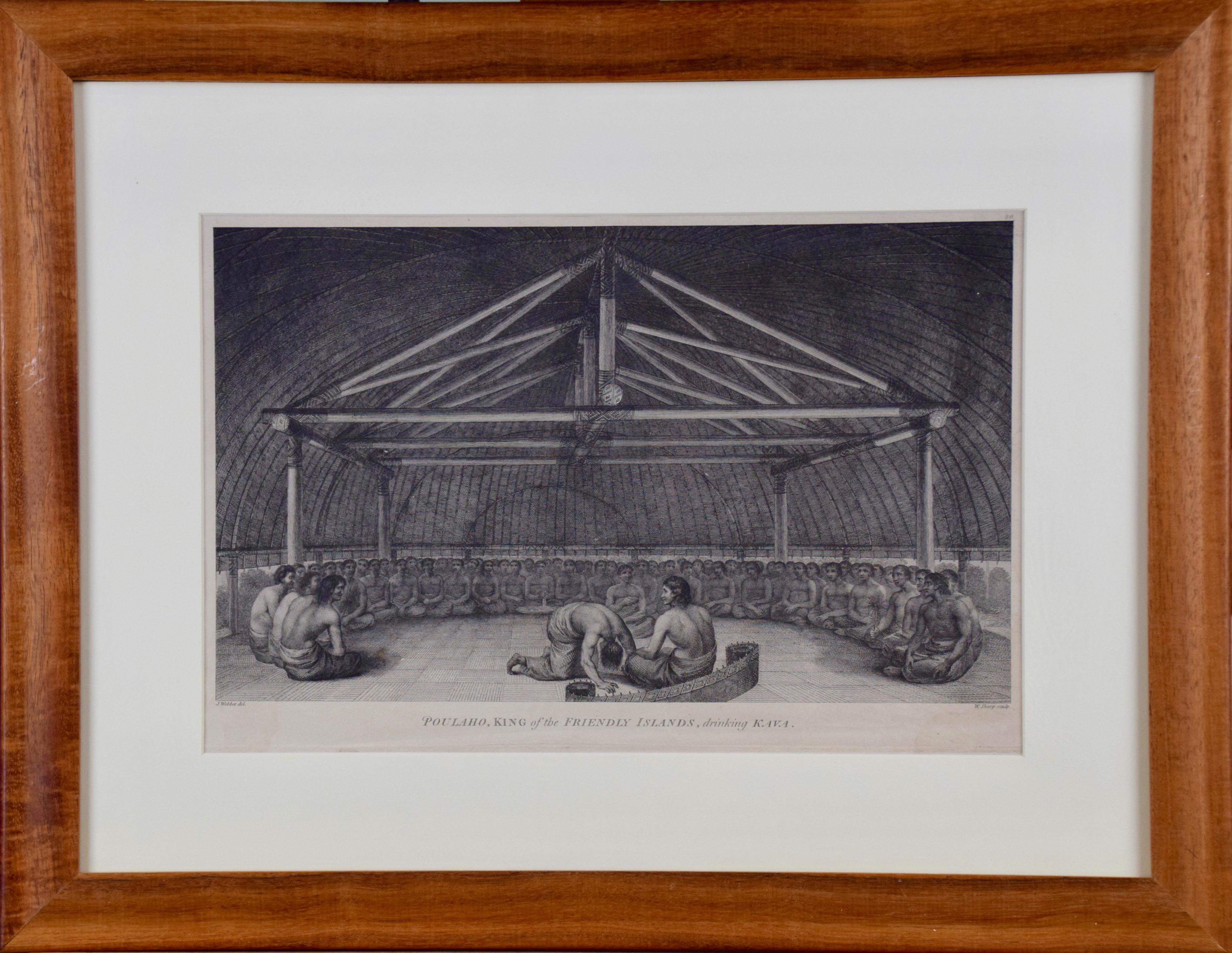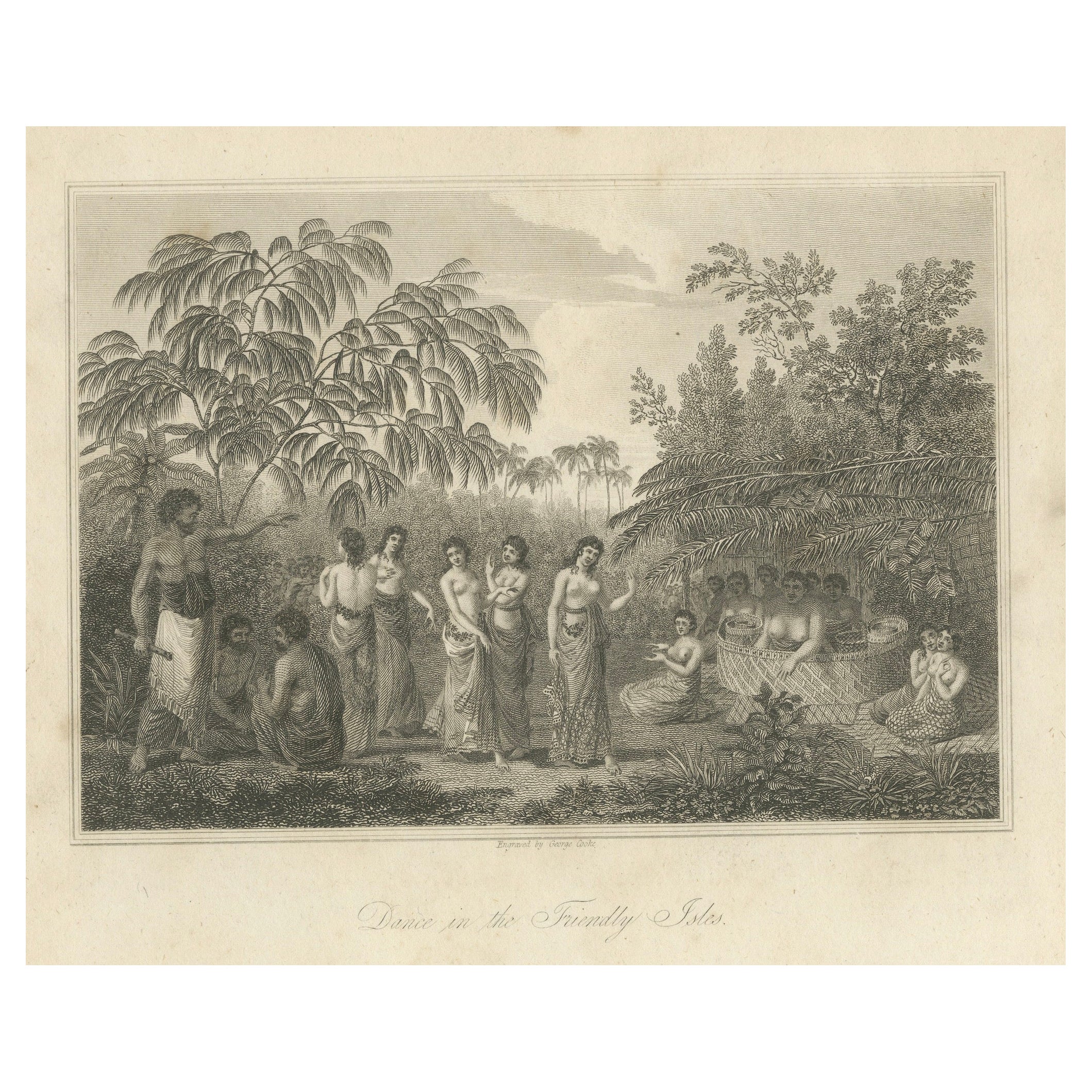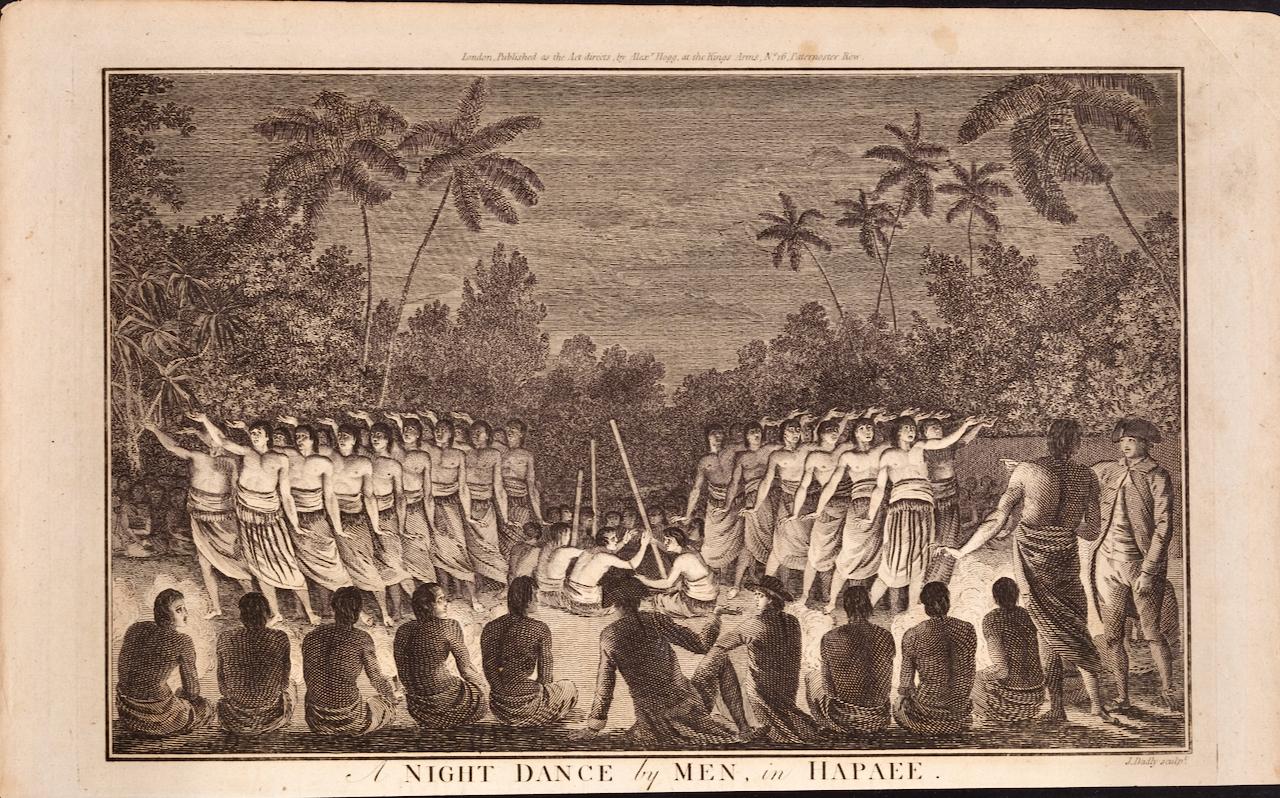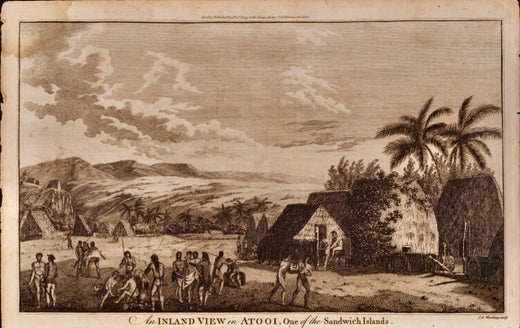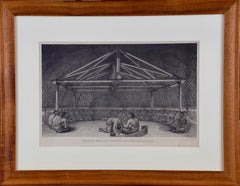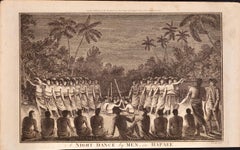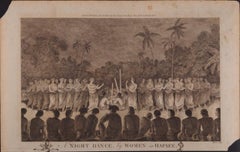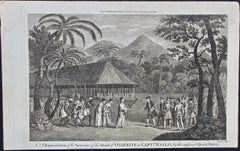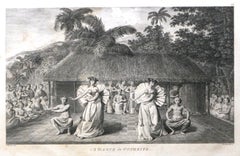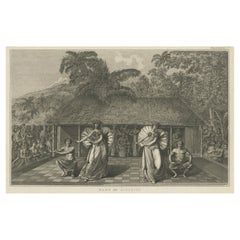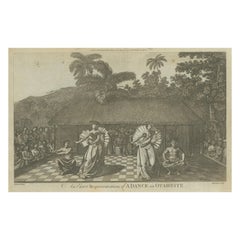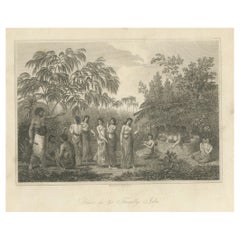Items Similar to "A Dance in Otaheite" (Tahiti), Engraving from Captain Cook's 3rd Voyage
Want more images or videos?
Request additional images or videos from the seller
1 of 11
John Webber"A Dance in Otaheite" (Tahiti), Engraving from Captain Cook's 3rd Voyage1784
1784
$2,375
£1,803.87
€2,084.07
CA$3,328.65
A$3,725.38
CHF 1,944.36
MX$45,430.47
NOK 24,885.21
SEK 23,557.04
DKK 15,553.12
Shipping
Retrieving quote...The 1stDibs Promise:
Authenticity Guarantee,
Money-Back Guarantee,
24-Hour Cancellation
About the Item
"A Dance in Otaheite" (Tahiti) is an engraving created by William Sharp (1749-1824), from a drawing by John Webber (1752-1793), who was the artist on Captain James Cook's 3rd and final voyage of discovery. It is a plate in the atlas of "A Voyage to the Pacific Ocean Undertaken by the Command of His Majesty, for Making Discoveries in the Northern Hemisphere", the official British Admirality sanctioned journal published upon completion of the voyage in London in 1784 by Strahan & Cadell.
Two women and two men wearing ceremonial costumes, performing a dance outdoors standing on a mat. Three men are playing the drums in the background, in front of a thatched roof building. An audience of men are sitting on both sides of the stage. By the time Webber arrived in Tahiti, 'south sea' imagery had become familiar. Webber gave concentrated attention to dance. He had the opportunity to distinguish the Tahitian dance from the more formalized dancing of Tonga. Whereas they seem to have called to mind the more formal dances of antiquity, the Tahitian dancing aroused memories of peasant and folk dancing.
This engraving is professionally framed in Koa wood. Koa wood is legendary in Hawaii. Not only is this amazing wood native to Hawaii, but it is known for the deep rich colors and varied grain pattern. Koa has an honored heritage in Hawaii and is highly revered and sacred. The word “koa” means “warrior” in Hawaiian. The warriors of King Kamehameha the Great, created canoes and weapons from a wood plentiful on the Big Island of Hawaii. This wood became synonymous with the warriors themselves, and it became known as koa.
The print is in excellent condition.
There are three other engravings listed from the official journal of Captain Cook's 3rd voyage available that are presented in identical Koa wood frames and double mats (LU117324682432, LU117324684052, LU117324684062). They would make a wonderful grouping for a display of 2, 3 or 4 prints. A discount is available for a grouping depending on the number of items included.
Hawaii was discovered by Captain Cook during this voyage. Hawaii was originally called The Sandwich Islands in honor of The Earl of Sandwich who, as head of the British Admiralty, authorized the funds necessary to finance the voyage. Captain Cook was killed by natives in Kealakekua Bay on the big island of Hawaii in 1779. His ships the Resolution and Discovery then returned to England. Other notables who were part of this expedition included Captain William Bligh, Cook's sailing master, who would later go down in history as captain of the mutinous crew of the Bounty and George Vancouver who would later explore and chart North America's northwestern Pacific Coast regions, including the coasts of Alaska, Washington, and Oregon, as well as the province of British Columbia in Canada. Vancouver Island and the city of Vancouver, British Columbia are named for him, as is Vancouver, Washington.
- Creator:John Webber (1751 - 1793, British)
- Creation Year:1784
- Dimensions:Height: 21.75 in (55.25 cm)Width: 23.75 in (60.33 cm)Depth: 0.88 in (2.24 cm)
- Medium:
- Movement & Style:
- Period:1780-1789
- Condition:
- Gallery Location:Alamo, CA
- Reference Number:Seller: #38541stDibs: LU117324684022
John Webber
John Webber (1751-1793) was recommended to the Admiralty for appointment as artist for the Captain Cook's 3rd voyage by the Swedish botanist Daniel Carlsson Solander (1733-1782) who had accompanied Cook on his first voyage. Just 24 years old when he joined the Captain Cook’s ship the Resolution at Plymouth one week prior to departure, Webber's skill in both portraiture and landscape resulted in a visual record of Cook's third voyage that is unsurpassed in the annals of 18th century exploration.
About the Seller
5.0
Platinum Seller
Premium sellers with a 4.7+ rating and 24-hour response times
Established in 2011
1stDibs seller since 2019
285 sales on 1stDibs
Typical response time: 1 hour
- ShippingRetrieving quote...Shipping from: Alamo, CA
- Return Policy
Authenticity Guarantee
In the unlikely event there’s an issue with an item’s authenticity, contact us within 1 year for a full refund. DetailsMoney-Back Guarantee
If your item is not as described, is damaged in transit, or does not arrive, contact us within 7 days for a full refund. Details24-Hour Cancellation
You have a 24-hour grace period in which to reconsider your purchase, with no questions asked.Vetted Professional Sellers
Our world-class sellers must adhere to strict standards for service and quality, maintaining the integrity of our listings.Price-Match Guarantee
If you find that a seller listed the same item for a lower price elsewhere, we’ll match it.Trusted Global Delivery
Our best-in-class carrier network provides specialized shipping options worldwide, including custom delivery.More From This Seller
View All"King of the Friendly Islands" (Tonga); Engraving from Captain Cook's 3rd Voyage
By John Webber
Located in Alamo, CA
"Poulaho, King of the Friendly Islands, Drinking Kava" is an engraving created by William Sharp (1749-1824), from a drawing by John Webber (1752-1793), who was the artist on Captain James Cook's 3rd and final voyage of discovery. It was published in the atlas of "A Voyage to the Pacific Ocean Undertaken by the Command of His Majesty, for Making Discoveries in the Northern Hemisphere", the official British Admirality sanctioned journal published upon completion of the voyage in London in 1784 by Strahan & Cadell.
Captain Cook visited Tonga on his 3rd voyage, which he named The Friendly Islands because of the warm welcome he and his crew received, unlike some of the other more hostile Pacific islands. The engraving depicts Cook and his men observed a kava ceremony at the village of Mu’a on Tongatapu. King Paulaho sits in the centre foreground, his back to the spectator with a man kneeling before him. The ceremonial mat depicted behind Paulaho indicates that nobody was allowed to sit behind him. The figure in the centre holds a single cup, referring to the Tongan custom of offering the cup to the king first. Kava is native to the islands of the South Pacific and was first described for English readers in 1768 by Captain James Cook. The kava root has been used for centuries as a central feature of ceremonies and celebrations because it was able to bring about a calming and pleasant social atmosphere. The root was crushed and processed into coconut milk to become the focal ceremonial beverage, simply referred to as kava.
This engraving is presented in a Koa wood frame and a white mat. Koa wood is legendary in Hawaii. There are occasional faint spots, but the print is otherwise in very good condition. This amazing Koa wood is native to Hawaii and it is known for the deep rich colors and varied grain pattern. Koa has an honored heritage in Hawaii and is highly revered and sacred. The word “koa” means “warrior” in Hawaiian. The warriors of King Kamehameha the Great, created canoes and weapons from a wood plentiful on the Big Island of Hawaii. This wood became synonymous with the warriors themselves, and it became known as koa.
There are three other engravings listed from the official journal of Captain Cook's 3rd voyage available that are presented in identical Koa wood frames and mats (LU117324682422, LU117324684052, LU117324684032). They would make a wonderful grouping for a display of 2, 3 or 4 prints. A discount is available for a grouping depending on the number of items included.
Captain Cook is remembered as one of the greatest explorers and navigators in history. His explorations included Australia, New Zealand and islands of the South Pacific and the northwest coast of North America. Hawaii was discovered by Captain Cook during this voyage. Hawaii was originally called The Sandwich Islands in honor of The Earl of Sandwich...
Category
1780s Realist Figurative Prints
Materials
Engraving
A Night Dance by Men in Tonga: An Original 18th C. Engraving, Cook's 3rd Voyage
By John Webber
Located in Alamo, CA
"A Night Dance by Men in Hapaee" is an original 18th century engraving from a drawing by John Webber (1751-1793), who was the artist who accompanied Captain Cook on his third voyage ...
Category
1780s Landscape Prints
Materials
Engraving
A Night Dance by Women in Tonga: Original 18th C. Engraving, Cook's 3rd Voyage
By John Webber
Located in Alamo, CA
"A Night Dance by Women in Hapaee" is an original 18th century engraving from a drawing by John Webber (1751-1793), who was the artist who accompanied Captain Cook on his third voyag...
Category
1780s Landscape Prints
Materials
Engraving
Surrender of Tahiti to Captain Wallis: An Original 18th C. Engraving
By John Webber
Located in Alamo, CA
"A Representation of the Surrender of the Island of Otaheite to Capt.n Wallis, by the Supposed Queen of Oberea" is an original 18th century engraving created by Sparrow, from a drawi...
Category
1780s Landscape Prints
Materials
Engraving
Reception for Captain Cook, Tonga: Original 18th C. Engraving, Cook's 3rd Voyage
By John Webber
Located in Alamo, CA
"The Reception of Capt. Cook in Hapaee" is an original 18th century engraving from a drawing by John Webber (1751-1793), who was the artist who accompanied Captain Cook on his third ...
Category
1780s Landscape Prints
Materials
Engraving
Four Koa Wood Framed 18th C. Engravings from Captain Cook's 3rd Voyage Journal
By John Webber
Located in Alamo, CA
A grouping of four framed engravings of Hawaii, Tahiti, Tonga and Vancouver Island from the atlas of the official British Admiralty sanctioned journal of Captain Cook's 3rd Voyage entitled "A Voyage to the Pacific Ocean Undertaken by the Command of His Majesty, for Making Discoveries in the Northern Hemisphere", published upon completion of the voyage in London in 1784 by Strahan & Cadell. These engravings were made from drawings by John Webber (1752-1793), who was the artist on Captain James Cook's 3rd and final voyage of discovery. The set of engravings includes: "A Canoe of the Sandwich Islands, the Rowers Masked", Plate 65 in the atlas; "A Dance in Otaheite" (Tahiti), Plate 28; "King of the Friendly Islands" (Tonga), plate 20; "Inside of a House in Nootka Sound" (Canada), plate 42.
These engravings are professionally framed in Koa wood, the same wood as was used to make the canoes of the ancient Hawaiians. Koa wood is legendary in Hawaii. Not only is this amazing wood native to Hawaii, but it is known for the deep rich colors and varied grain pattern. Koa has an honored heritage in Hawaii and is highly revered and sacred. The word “koa” means “warrior” in Hawaiian. The warriors of King Kamehameha the Great, created canoes and weapons from a wood plentiful on the Big Island of Hawaii. This wood became synonymous with the warriors themselves, and it became known as koa.
These four engravings would make a wonderful grouping for a display of 2, 3 or 4 prints. They may be purchased separately or in groups on 1stDibs. Their listing Reference #'s are: LU117324682432, LU117324682022, LU117324684052 and LU117324684062. A discount is available for a grouping depending on the number of items included.
Hawaii was discovered by Captain Cook (1728-1779) during this voyage. Hawaii was originally called The Sandwich Islands in honor of The Earl of Sandwich...
Category
1780s Other Art Style Landscape Prints
Materials
Engraving
You May Also Like
A Dance in Otaheite (Tahiti) 1784 James Cook Final Voyage by John Webber
By John Webber
Located in Paonia, CO
A Dance in Otaheite ( Tahiti ) is from the 1784 First Edition Atlas Accompanying Capt. James Cook and King; Third and Final Voyage of Captain James Cook. John Webber (1752-1793) who...
Category
1780s Realist Figurative Prints
Materials
Engraving
Antique Copper Plate Engraving Depicting Natives of Tahiti Dancing, 1803
Located in Langweer, NL
Antique print titled 'Dans van O-Tahiti'.
Antique print depicting natives of Tahiti, dancing. Originates from 'Reizen Rondom de Waereld door James Cook (..)'.
Artists and Eng...
Category
Antique Early 1800s Prints
Materials
Paper
$331 Sale Price
20% Off
Celebration of Tahitian Culture: Traditional Dance at Otaheite, circa 1785
Located in Langweer, NL
An antique engraving depicting a dance scene titled "An Exact Representation of a Dance in Otaheite," Otaheite being an archaic name for Tahiti in French Polynesia. This engraving would have been created as a part of a series to document the culture and life of the Tahitian people, likely observed by European explorers during one of the many voyages to the South Pacific in the 18th century.
In the foreground, there are central figures engaged in a dance, wearing traditional Polynesian attire, which includes wraps around their waists and adornments that seem to represent status or a part of the dance costume. They are holding what appear to be fans, which may be part of the traditional dance. The dancers' poses suggest movement and a performance aspect to the scene.
Behind the dancers, we can see a group of musicians providing the accompaniment, playing drums, which indicates the importance of music and rhythm in the dance. To the right, there is an audience of seated individuals, likely members of the community, watching the performance.
The background of the scene includes thatched huts and a lush landscape with palm trees, depicting a typical village setting in Tahiti. The checkerboard pattern on the ground where the dance takes place is notable, as it adds a sense of structure to the scene.
This image would have been intended for a European audience unfamiliar with Tahitian culture and would have served as a visual record of the encounters between European explorers and the peoples of the Pacific Islands.
The engraving you've uploaded, titled "An Exact Representation of a Dance in Otaheite," is likely from a work documenting the voyages of Captain James Cook, given the style and subject matter. Captain Cook made three voyages to the Pacific Ocean during the 18th century, and his encounters with the peoples of the Pacific, including those of Tahiti (Otaheite), were extensively recorded and published.
The engravings from Cook's voyages were made by artists who accompanied him, such as John Webber on his third voyage, or were based on sketches made by other crew members. These images were then published in the official accounts of the voyages. The most notable of these accounts is "A Voyage to the Pacific Ocean" undertaken during Cook's third voyage from 1776 to 1780, which was published in the years following his death in 1779.
Another possible source for this engraving could be from the accounts of Joseph Banks. Banks was a naturalist who joined Cook on his first voyage (1768-1771) aboard the HMS Endeavour and was responsible for extensive collections and descriptions of Pacific cultures. His collections and later works also included illustrations and engravings of the scenes and peoples encountered.
Given that the engraving is labeled as "London Published as the Act directs by Alexr. Hogg at the Kings Arms...
Category
Antique 1780s Prints
Materials
Paper
$94 Sale Price
20% Off
Rhythms of the Pacific: A Communal Dance in Tonga, Engraving Published in 1812
Located in Langweer, NL
The engraving depicts a serene and communal scene labeled as "Dance in the Friendly Isles." The Friendly Isles is an older name for the Kingdom of Tonga in the South Pacific. This pi...
Category
Antique Early 19th Century Prints
Materials
Paper
$246 Sale Price
20% Off
Free Shipping
Antique Print of Dancing Girl of Otahiti or Tahiti by Cook, 1803
By James Cook
Located in Langweer, NL
Antique print titled 'Een Meisjen van Otahiti danssende'. Antique print depiciting a female native of Tahiti, dancing. Originates from 'Reizen Rondom de Waereld door James Cook (..)'...
Category
Antique 19th Century Prints
Materials
Paper
$227 Sale Price
20% Off
First Contact in Owhyhee: Webber's 1785 Engraving of Hawaii
Located in Langweer, NL
First Contact in Owhyhee: Webber's 1785 Engraving of Hawaii
Description: This captivating print, titled "Vue prise à Owhyhee et entrevue avec les naturels," offers a glimpse into a ...
Category
Antique 1780s Prints
Materials
Paper
